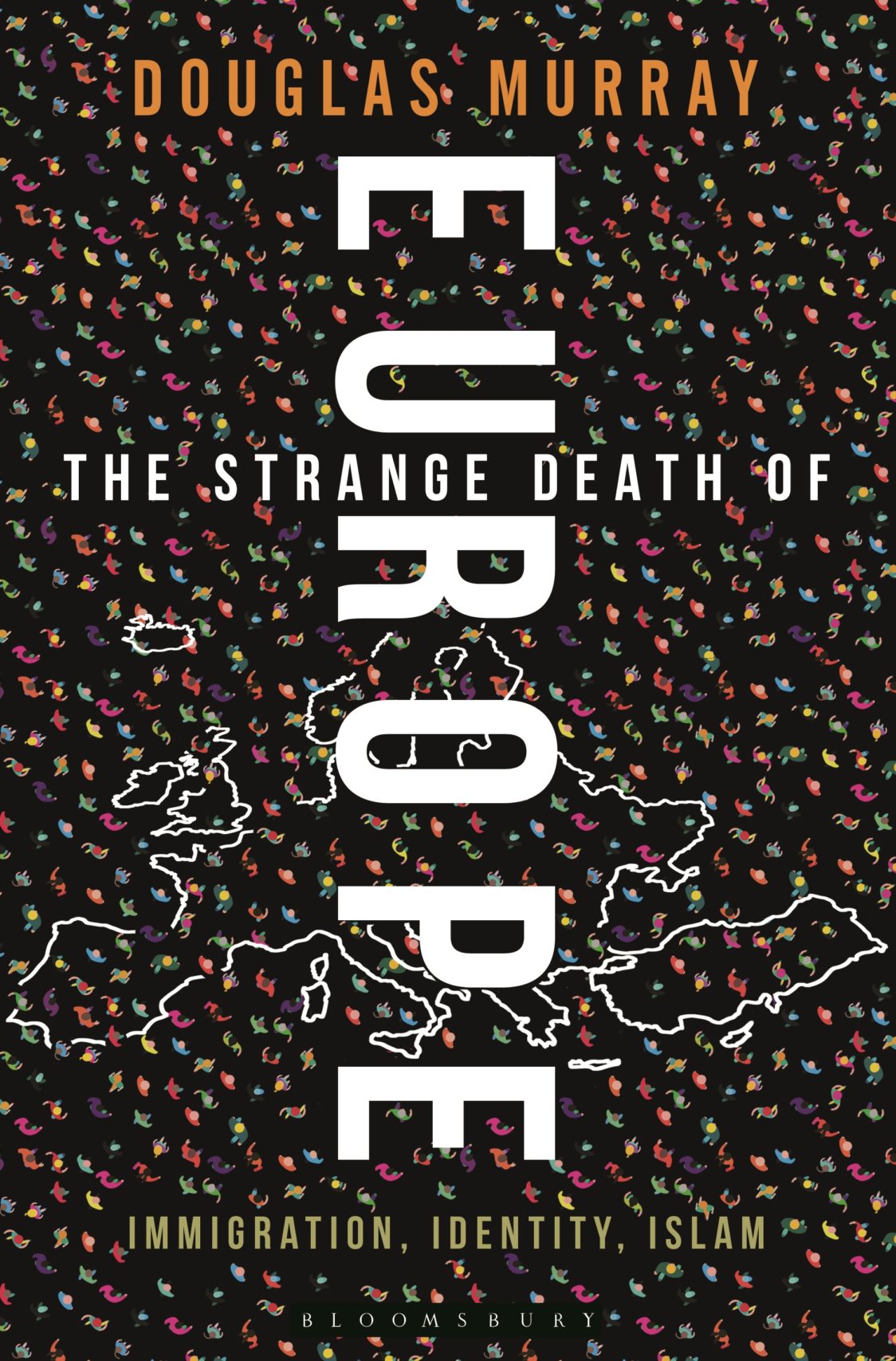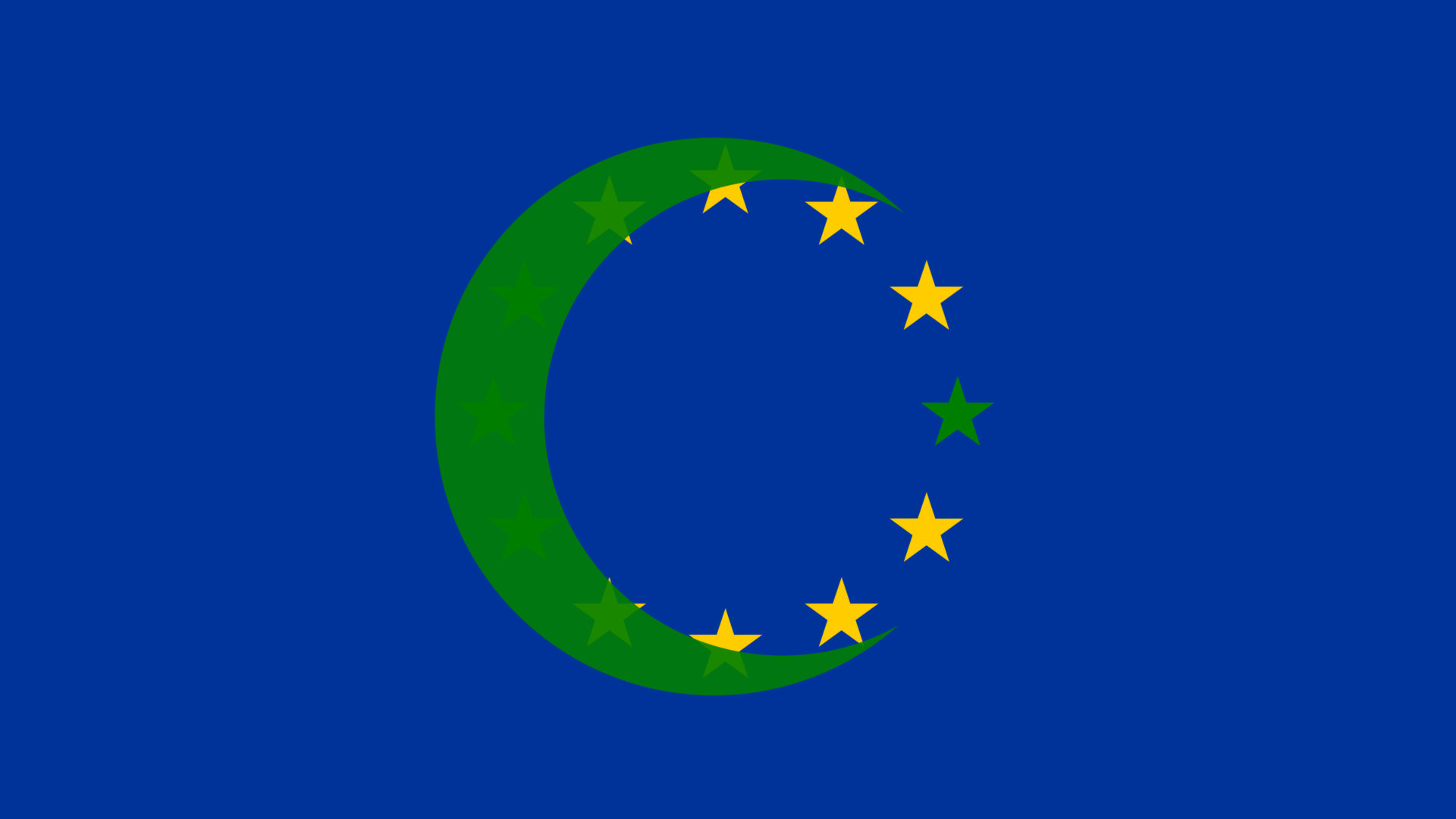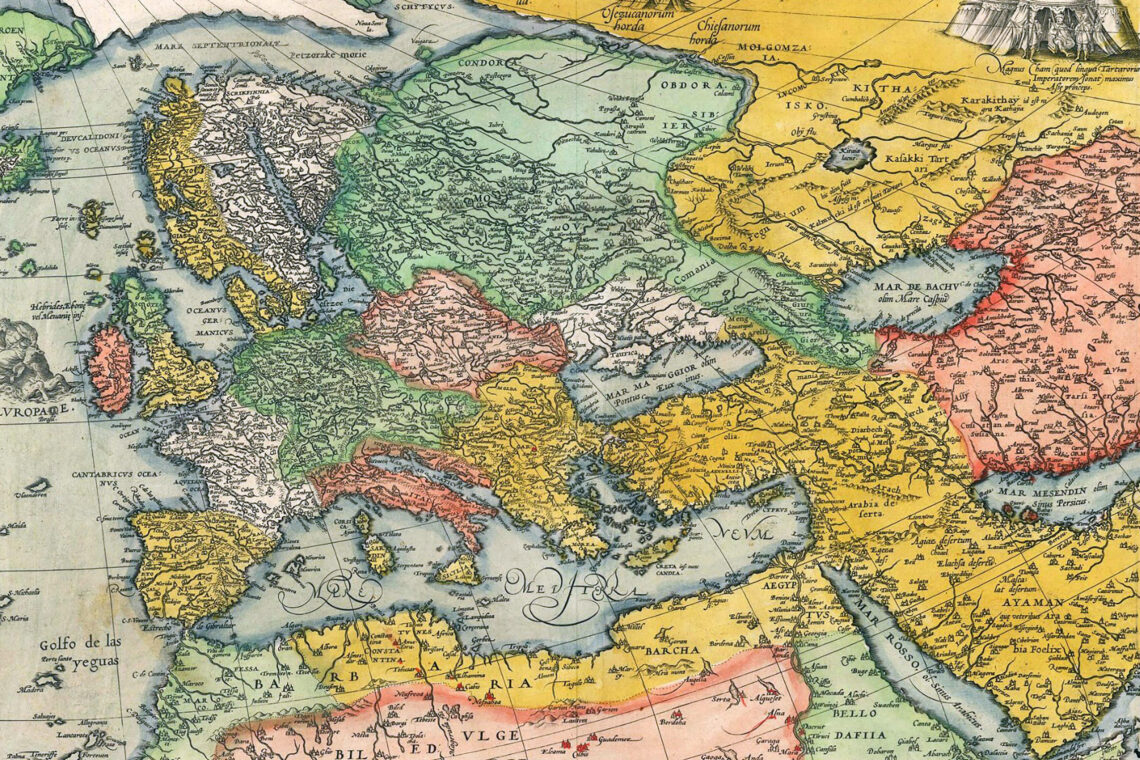To celebrate New Year’s Eve in 2017, German authorities sounded more like the vice cops who roam the streets of a few Muslim-majority nations: They created safety zones for women in order to protect them from the thousands of Muslim men who descend on such festivities like packs of wolves looking for prey. Memories of what happened in Cologne in 2015, when something like 1,200 women were sexually assaulted and robbed in the heart of the city, had traumatized a nation—indeed a continent—that was already in the process of figuring out how to deal with the disruptive powers of Islamic traditions that are, for the most part, alien and antithetical to modern European values.
For decades now, at least since the publication of Salman Rushdie’s novel The Satanic Verses unleashed Muslim furor, with the sword of the Iranian Ayatollah dangling dangerously close to the heart of the West, Europeans have been living in a state of extreme fear, undercutting their own hard-earned traditions of freedom of speech by increasingly refusing to publish or release anything that would offend Muslim sensibilities. When an imam could publicly declare on Dutch radio that Muslims are duty-bound to kill those who resist their religion’s call; when cartoonists who choose to depict Islam’s prophet are assassinated in broad daylight; when innocent pedestrians are run over with trucks and tourist areas are thrown into turmoil; when the laissez-faire French and Dutch suddenly find themselves consumed by endless political polemics involving headscarves, burqas and burkinis; when metropolitan London becomes more homophobic than Britain’s rural provinces because of its Muslim population; when Muslims in Britain would rather fight for ISIS than their own nation’s armed forces; when pubs are forced to close because they find themselves in Muslim-majority communities; and when the European joie de vivre is threatened by terrorists in Madrid, Paris, and London, we can easily understand the agony of liberal European elites. They want to save refugees and welcome immigrants but, when they do so, they end up undermining their own social values.
Regular Europeans (the publics), on the other hand, are clear headed about the question of Muslim immigration: In poll after poll, especially in the last decade, they say that Islam is incompatible with European values. Ironically, this is a view that is, first and foremost, espoused by the Muslims themselves. When Turkey’s Prime Minister (now President) Recep Tayyip Erdoğan told a crowd of Turks living in Europe that “assimilation is a crime against humanity,” he was stating what has always been a common practice. Muslim refugees and economic migrants want to make a living in Europe and be left alone to do their own cultural thing. Not only that, they insist on bending European laws and customs to their own minority preferences, thereby aggravating an already tense situation.
This is the unsettling background against which the prominent journalist Douglas Murray wrote his Spenglerian book titled The Strange Death of Europe. Reading it in the aftermath of Brexit and the election of Donald Trump added some poignancy to the experience. Murray takes us on a grand dystopian tour of a continent that has failed to deal with Muslims ever since a few countries invited them to work on a temporary basis after the Second World War. These immigrants didn’t return home; in fact, they started a process of chain migration that is still going strong today. The Arab Spring and the civil war in Syria further opened the floodgates to hundreds of thousands of Muslims, entering Europe through border nations like Italy, Greece, Malta, or Spain. As the numbers of Muslims grow, Europeans find themselves wrestling with issues they have never considered before. In the United Kingdom, the National Health Service now spends some 20 million pounds a year on translation services to accommodate immigrants who, in 2006, practiced genital mutilation on 74,000 females! (More than 130,000 females have suffered genital mutilation in Britain in the last three decades, yet “there have still been no successful prosecutions for the crime.”) In Sweden, where the rape of Swedish women by what in Germany has been called Muslim “rapefugees,” cops can no longer cope. Islam is certainly shaking Europe to its cultural core, but the typical response by the political and media elites to this challenge has been to sound liberal and enlightened, as if they were speaking to a private club of academics, not entrusted with serving their constituents and protecting their communities.

Murray is more than puzzled by Europe’s self-defeating attitudes; he is somewhat aghast at the sight of an entire civilization losing its nerve in the face of numerous and repeated barbarian onslaughts on it. Have Europeans succumbed to what the French call ennui or to the weariness of history known in German as Geschichtsmüde? When did Western Europe enter this long cycle of fatigue from which it has not been able to recover? Murray finds an answer in the 19th century, when the “two seismic blows” of biblical criticism and Darwin’s thesis dethroned the power of the Church for good. The institution that defined Europe and Europeans since antiquity, one whose edifices still awe tourists today, has been emptied out of meaning. Various philosophies, especially German absolutist ones, sought to offer alternative all-encompassing worldviews, but they felt like cold comfort to the masses and were outright dangerous when taken too literally. The failure of absolutism led to the cult of endless doubt (including self-doubt), a sort of fatal cynicism masquerading as intellectual agility or playfulness. No one has done a better job at capturing this sort of decadent malaise than the French novelist Michel Houellebecq who, while under protection, has the audacity to imagine his country’s cherished institutions taken over by Muslims.
For the longest time, European elites have turned a deaf ear to those who have warned against the danger of Islam. When, in 1997, the gay Dutch Marxist Pim Fortuyn published Against the Islamization of Our Culture, he was called racist, Nazi, and ferociously attacked by his fellow Dutch citizens until a “far-left vegan activist” shot him at close range and ended his life. Another Dutch man, the flamboyant provocateur Theo Van Gogh, expressed his views in the book Allah Knows Best (2003) and the film Submission (2004) and was gruesomely killed by a Moroccan. The gutsy Italian journalist, Oriana Fallaci, as well as the French actress Brigitte Bardot, spoke out against the insidious inroads of Islamic practices into their beloved traditions, but their voices were not enough to embolden their compatriots to change course.
Some did, however. In 2004, Geert Wilders left his Dutch Liberal Party (VVD) to form the Party for Freedom (PVV), which, in 2016, was the “most popular party in Holland.” In the German city of Dresden, a party called Pegida was formed on the simple platform of stopping the Islamization of the West and soon spread to other cities and countries. It would soon be joined by Alternative für Deutschland (AfD), a party that, in 2016, beat Angela Merkel’s Christian Democratic Union in regional elections. That same year, the Sweden Democrats, a party with right-wing antecedents, emerged as “the highest-ranking party in the Swedish polls.” In Britain, too, the English Defence League (EDL), battling constant harassment from the government, continues to fight back against the Islamization of the country.
Murray finds comfort in East European nations who simply close their doors to Muslims and suffer no guilt over their supreme desire to protect their cultures and traditions from unassimilable immigrants. Yet when these same Eastern Europeans flood into Britain (as they did between 2004 and 2013), Britons get overwhelmed and find strategies to stop such flows. One would think that Britain, France, Sweden, Germany and other prosperous West European economies would do everything in their power to lure such immigrants to their countries in order to counter and reduce Muslim immigration. That this is not the case makes the situation a bit more complex than the simple Islam versus Europe narrative. This is partly due to the fact that the author uses the broad but fluid category of Europe to make his case, perpetuating the illusion that the peoples of Europe are a united lot. Had he focused on his home nation, especially in light of Brexit, the argument would have been stronger. To me, entities like Europe, Arab nation and Muslim world are too general to be meaningful in any concrete sense. European identity, after all, is historically unimaginable without the threat of Islam.
A far more productive discussion is one that is ever alluded to but is probably beyond the scope of Murray’s book: Why is Islam a threat? Is it a threat only to Europe, or is it a threat to non-Muslims wherever they may be? In fact, the author tells us that Muslims commit far more violence on one another than they do on non-Muslims. Sunni fundamentalists are on a perpetual witch hunt, targeting anyone whose beliefs do not match theirs. Murray names a few daring writers and thinkers (either Muslims or of Muslim background) who have questioned Islamic tenets and have been ignored, disowned, and even vilified by the liberal Western media and politicians. I would suggest that this is the fatal mistake of European and Western elites, in general: The refusal to treat Islam as critically as they do their own religions, whether Christian or Jewish. Murray is aware that Muslim clerics cannot “stem the tide of criticism coming towards them,” so why not give that tide some real power? Self-doubting Muslims would be more open to Western intellectual traditions and, therefore, far easier to assimilate than the literalists who are constantly on a murderous spree. Yet, for Murray, it is not enough for Islam to be “deliteralised, wounded and defanged” because even such a positive outcome can’t solve Europe’s existential crisis.
At this point, one gets the impression—whether the author is aware of it or not—that the book is a lament for a dying Christian order that has left us entrapped in concentric circles of shallowness and entertainment, with no nobler pursuits to guide the European imagination. Instead of helping Europeans find a path out of this conundrum, philosophers and other thinkers conjure intricate ways to say nothing of substance. The German philosopher Jürgen Habermas echoed this same frustration in 2007 when he declared that “the enlightened modern age has failed to find a suitable replacement for a religious way of coping with the final rîte de passage which brings life to a close.” Barring coming up with a new religion for a different age, it does sound like European civilization, having offered the world tremendous cultural riches and inflicted on many nations untold suffering, has run out of steam just when marauding barbarians came knocking at its gates.
But then again, as we know from the great medieval Arab historian Ibn Khaldun, this might very well be the natural cycle of all civilizations that prosper out of their fighting instincts. Equipped with a better esprit de corps, nomadic tribes, like the refugees and immigrants today, find it easier to topple regimes that have grown bloated with ease and luxury and dominate people who have lost all sense of solidarity and the sense of the tragic. To expect a tired continent to repel barbarian invasions and resist the natural course of history may be a futile undertaking. But, then, is this doomsday scenario the only one left?
I, for one, don’t think so. A robust defense of modernity and the Enlightenment, instead of resurrecting the dead body of Christianity, may yet dissolve the Muslims’ ferocity and temper their mores. It could turn anti-European forces into new cultural allies and, therefore, expand the European sphere further south and east. We could even harness rising nationalist convictions in Europe and the United States to create new global missionaries for this strategy and avoid home-bound ideologies that could only further shrink the spaces of freedom and weaken the continent in the long run. To switch off the lights of the Enlightenment at this critical juncture in history is to risk plunging the world into another age of darkness.
Europe may never regain its Christian momentum, but this is not a good excuse to give up and surrender to death. Keeping the flame of reason alive is really worth the fight. The goal, in the end, is the same: We want all human beings to have a dignified existence and our embattled planet—together with all the lifeforms that depend on it—to be protected from destruction. No other entity besides Europe is better qualified to lead the way.





It seems to me that this Islamic invasion of Europe is encouraged and desired perhaps as a continuation of the original Gladio “Strategy of Tension.” Islamic Terror is a tool in the hands of men whose whole desire more power and more control. From the arming of the Taliban by Jimmy Carter to the war against Assad where the principles sought a Salifist Caliphate as the preferred way to depose him we can see Western hands pulling terrorist strings. Ironically of course is in the past Soviet support for the PLO. I do not know if the Western populations understand the war against Islamic Fundamentalism is a civil war first against the global Mafia that controls governments.
I read your article “Islam and the Future of Europe” and I fully agree with your analysis of the European situation in relation to Islam.
I think you are so brave in making a criticism, especially knowing the positions of radicalism on the part of some who say they speak on behalf of the Muslims. In Europe, as you well know, more often than not, we are not able to make this criticism in public, losing one of the values that our culture is proud of–freedom of expression. But I do not see clearly what is your position on possible solutions.
A brilliant expose on the Islamification of Europe. Thank you for your insightful article.